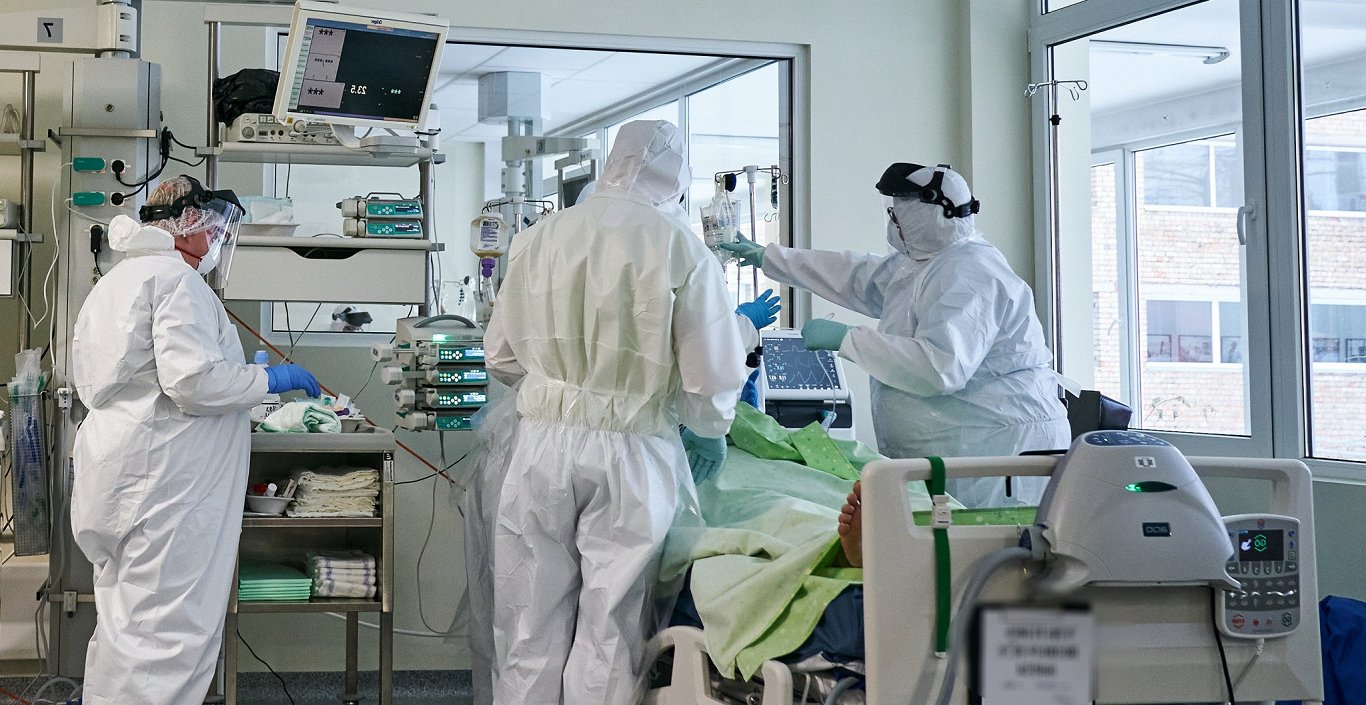IN SHORT:
- Daugavpils Hospital is ready, but there is still a lack of space and equipment.
- In Jēkabpils, the situation of Covid-19 in hospitals was not taken into account; reconstruction is still underway.
- The NMPD notes that in some hospitals, Covid-19 prevents patients from receiving reconstruction.
- The Ministry of Health does not emphasize that preparations for the Covid-19 crisis are not complete.
- The ministry explains that medical equipment cannot be purchased because it is lacking in the market.
Hospitals lack equipment
As far as possible, hospitals have been balancing Covid-19 patient care for several weeks. During this time, Daugavpils Regional Hospital has about 240 patients every day, sometimes almost 260, which is the maximum limit for this hospital. There are more patients only in Riga East Hospital. With the rapid influx of Covid-19 patients, moments of crisis have been experienced several times. “For example, Kraslava helped right away and brought eight beds when we needed them. Because otherwise we could not open the department in time. It helped us to have one holiday, ”described the situation of Grigory Semyonov, the head of Daugavpils Regional Hospital.
In preparation for the Covid-19 outbreak, additional beds have already been installed and existing artificial lung ventilation equipment, portable X-rays, monitoring systems and well-equipped modular houses outside the hospital buildings have been adapted. However, what has been prepared before is no longer enough.
In this wave, there are twice as many Covid-19 patients in Daugavpils Hospital as in the previous one.
Semyonov said: “Most recently, 36 beds were brought to us from the warehouses of the Emergency Medical Service. Of course, these are outdated beds, functional beds that university hospitals were about to write off, but when we compare them to the beds we have already had to put patients on, on which probably no one would want to sleep, well, of course it’s a bonus . ”
Of the 86 million allocated by the state this year to increase hospital capacity, Daugavpils Hospital’s beds and equipment were just over one million euros. The Lion’s Court is dedicated to large hospitals in Riga, which are also rebuilding their buildings to separate patient flows. But the largest of the regional hospitals – about five million euros – was allocated to Jēkabpils Regional Hospital. It currently cares for 50 to 60 Covid-19 patients a day.
The management of the hospital admits that more has been done, because nothing has been allocated at the very beginning. However, even larger funds do not immediately lead to greater preparedness. The new intensive care units are still under construction and will be ready in December, although the Covid-19 wave is currently at its peak. “You see, it’s too late that we didn’t know what this wave would be like, and we don’t know what will happen in a year, to be honest. Maybe something will change again, and maybe something different will happen again. Well, it seemed that it couldn’t be crazier anymore.
In the first wave, it also seemed to us that it couldn’t be crazier anymore. ”
said Renārs Putniņš, a member of the board of Jēkabpils Hospital.
Incomplete repairs do not mean that patients are not admitted. At first, six patients seemed like a lot, but now that number has increased tenfold. Intensive care is also provided, but in less suitable conditions. “It simply came to our notice then [2. novembrī] we are scheduled to have seven resuscitation beds, but there are 10 in reality. We are already working beyond that norm. And three more patients are waiting for a place in resuscitation who need artificial ventilation. Doctors stand by with a bag of ambulances and are ready to start breathing at any time, ”explained Putniņš.
Similar repairs are ongoing in other hospitals; Reconstruction is also financed from other sources, such as European funds. And not everywhere you can find a place for Covid-19 patients in parallel by simply adapting something. Liene Cipule, Director of the Emergency Medical Service, admitted that this also affects the situation. “Because all this infrastructure, which is now being adapted, is not really usable. We have some hospitals where there are less opportunities to expand the beds just because repairs are taking place there, such as Jurmala Hospital or Dobele Hospital, ”explained Cipule.
The medical equipment market is in high demand
The Ministry of Health, while explaining to the government where the Covid-19 investment was left, has so far not emphasized that in fact the preparations have not been completed at all. The largest unspent amount of the 86 million allocated is for investments, namely the conversion of departments and buildings. However, the purchase and equipping of beds is not completed everywhere.
Indra Dreika, State Secretary of the Ministry of Health, stated: “The purchase of beds, ie the purchase of equipment, must be completed by the end of this year.
And there are also procurements that could not be realized immediately in the spring, when these procurements were relevant. Because simply these devices are not available.
We must also take into account the fact that the market is already the same all over the world (..) Even for the same oxygen pipes. They currently have a very large deficit. Because a lot of countries are obviously doing exactly what we are doing, they are reconstructing their oxygen systems to be able to adapt to the next Covid-19 crises. ”
In addition, new financial requests are already being made to prepare for what was not previously planned. Namely, more than 2,000 and 3,000 Covid-19 patients are admitted to hospitals. The Ministry of Health estimates that it will need six and a half million euros from the state budget. The calculations change for each government meeting, and it is still difficult to shell out a clear picture of them.
“The pace was really very fast, because we were really ready for such a rapid rise, I must say, but it made us realize that we have to have a plan for what happens next. And that’s what we created. Thanks to everyone who was forced to set up. We also very much hope that we will not have to expand this bed plan, ”added the State Secretary of the Ministry.
Latvian hospitals are also waiting for additional resources from foreign aid, which has already been partially disbursed in the first week of November. You will have to return everything later. Hospitals say that it is also more rational than to buy equipment that will paint dust after the outbreak and will have to be written off. However, before requiring this, a decision had to be made to reduce the quality of care at the expense of staff. The Ministry of Health does not intend to request medication from foreign aid for the time being. In order to be able to work with patients in many times larger numbers and with the additional medical devices provided, the quality requirements have been reduced, ie the number of patients who have to be cared for by one doctor or nurse has increased.
–


